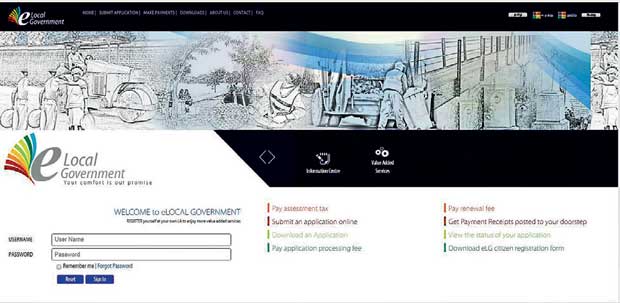10 Jan 2018 - {{hitsCtrl.values.hits}}

Although Sri Lanka has embarked on digital inclusiveness for its citizens and the public sector, substantial transactions and interactions through traditional channels are still required on a daily basis resulting in significant time and resource constraints for both parties.
The Information and Communication Technology Agency of Sri Lanka (ICTA)’s eLocal Government (eLG) Project significantly automates key day to day transactions provided by local authorities ensuring more people-friendly, effective and efficient services through the use of ICT.
The potential of engaging and empowering citizens through eLG cannot be understated as local councils provide a host of important local public services and is a critical player in the delivery of public service for all citizens.
Through eLG, citizens now access effective and efficient online transactional services, affording individuals and businesses the opportunity to complete their dealings with their local authority in a convenient and efficient manner. The eLG digital transformation has also unlocked a range of productivity and efficiency benefits for local authorities and the government.
Additionally, as digital transactions are generally faster, more convenient and mobile, they are set to become the preferred channel for citizens to access government services further saving costs and time and reducing inefficiencies.
Offering online transactions at local authorities are also set to enhance Sri Lanka’s image and ranking in the global ease of doing business index. The eLG platform will prove especially attractive for potential investors with improved and streamlined processes helping to support investment decisions and country growth. The net dividend of digital transformation through eLG is likely to deliver significant economic benefits for governments and citizens.
As an initial step, eLG has been launched in over 30 Local Government and Provincial Councils across all nine provinces, such as Municipal Councils, Urban Councils and Pradeshiya Sabhas across the island. During the next phase all 341 local authorities across the island will have access to the eLG platform.
Through the digitalising of transactions, citizens can now pay assessment taxes, apply for building approvals, and business and industrial licenses along with other licenses for occupational and industrial functions, fire safety and environmental compliance certificates and other environmental certifications, Apply for approvals for structural land development, land subdivision and amalgamation or even obtain clearance for high rise structures, obtain ad-hoc services such as booking the municipal sports complex or reserve gulley cleaning service.
“Although we live in an increasingly online world, a significant part of our population remains digitally excluded. A key element towards a smart nation/city is inclusive digital transformation delivering significant net economic benefits for citizens and the government. Through ICTA’s eLG project our local authorities will transform responding to digital change and developing seamless and transactional public services where all can take full advantage of the benefits of the digital revolution,” said Provincial Councils and Local Government Minister Faiszer Musthapha.
These online services will reduce customer waiting time and long queues, offering easy retrieval of data and online payments creating a more streamlined, standardised and redesigned process.
Staff at local authorities too have greatly benefitted as a result of the new platforms. ICTA has ensured capacity building for all staff providing ICT skills development and the required software applications and equipment fostering greater digital inclusion so that all can benefit from the opportunities technology brings.
Commenting on the agency’s role, ICTA Sri Lanka Chairperson Chitranganie Mubarak said: “ICTA’s eLG project has enabled our local authorities to progress in enabling citizens to carry out a host of transactions online. The eLG platform not only helps councils provide better services for their residents that is efficient, less time consuming and making decision-making faster, more adaptable, but will also enable local communities to increase their online engagement and take optimum advantage of the opportunities of the digital economy.”
26 Dec 2024 22 minute ago
26 Dec 2024 47 minute ago
26 Dec 2024 49 minute ago
26 Dec 2024 2 hours ago
26 Dec 2024 2 hours ago